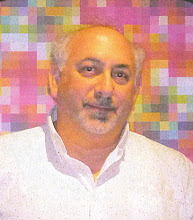Below is an excerpt from my article in the May/June issue of AMERICAN THEATRE (AT) magazine. It is the lead feature in the special section: The Israeli-Palestinian Conflict On Stage. AT does not usually post the entire content of its magazine online, so I don't think this will be accessible that way, but you can check after May 1st on tcg.org. (If you are unable to obtain a copy of AT for purchase or at your library, feel free to email me and I will email you the full text of my article.)
*******************************************************************
"Who Can Speak for Me?"
Israel’s vibrant theatre scene boldly assays the
Palestinian conflict—but with authentic voices
from the other side mostly missing
We compound our suffering by victimizing each other. —Athol Fugard
It seemed at first that Nurith Yaari had bent over backwards to demonstrate that Israel’s theatre scene is not shy about self-reflection, self-criticism and, perhaps, even self-flagellation, based upon the plays she selected for inclusion in IsraDrama 2007.
Surprisingly, half of the plays staged in this November–December showcase in Tel Aviv were political dramas taking dead aim at Israeli-Palestinian relations in ways that often reflect less-than-flattering images of Israel’s official policies and the attitudes of many of its citizenry. Yaari is a professor of theatre at Tel Aviv University and artistic director of IsraDrama, sponsored by the Institute of Israeli Drama and designed to encourage production of and scholarly attention to the work of Israeli dramatists.
Despite its relative youth as a modern nation, celebrating its 60th anniversary on May 8, Israel has an immensely vibrant theatre scene, with among the world’s highest per-capita attendance. According to Gad Kaynar, another professor of theatre at the university and head of Israel’s branch of the International Theatre Institute, “The data is rather astonishing: On any given evening one can watch in Tel Aviv alone, with its population of more than 350,000, no less than 40 theatre performances in mainstream
theatres as well as on fringe and festival stages.”
Some might see this phenomenon as making up for lost time. “Drama’s origins in pagan myth, its growth within Greek culture and its development within Christianity have ensured the hostility of the Jewish religious authorities to theatrical manifestations throughout the ages,” former Oxford University scholar Glenda Abramson has written.
In fact, Kaynar points out that this historical antipathy took a new turn when several modern Israeli theatres started pushing boundaries, beginning with Hanoch Levin’s 1970 play The Queen of the Bathtub, which “dared to question the moral stance of a power-drunk Israeli society following victory in the Six-Day War (1967),” a production that provoked “massive demonstrations.” The role of theatre also reached Israel’s national parliament, the Knesset. In 1986, the Israeli Censorship Board decided “to ban the staging of Shmuel Hasfari’s The Last Secular Jew, a satirical cabaret depicting the apocalyptic vision of Israel as the tyrannical theocracy of Judea,” says Kaynar. A public outcry led the Knesset to abolish play censorship. In 1988, Kaynar reports, playwright Joshua Sobol was accused “of ‘self-hatred’ and ‘destruction of national and religious morals,’ following the violent interruption by right-wing fanatics of the premiere of his 1988 The Jerusalem Syndrome, which compares the devastation of the Second Temple and the Israeli occupation of the West Bank.”
Israel’s contemporary theatre clearly serves as a national moral
conscience, though that fact is little known elsewhere. So it made great sense for Yaari to expose 63 theatre practitioners from 21 countries to a strong dose of drama that, according to Kaynar, is “a ritual of existential value.”
These were works produced not only by low-budget fringe theatres; included among their creators were Israel’s two largest theatres, the Habima National Theatre and Tel Aviv’s municipal theatre, Cameri, major companies with significant government subsidies, large audiences and strong philanthropic support. And since IsraDrama was funded by the Ministry of Foreign Affairs, raising the curtain on these unvarnished depictions of life in Israel today received an official imprimatur as well.
The first reaction of many attendees was that it is commendable
for Israeli theatres to be unafraid to tackle head-on the most explosive political issue dividing their country today. Some of these visiting theatre professionals, including Americans, quietly lamented a lack of similar courage in their own nations’ theatres.
Yet there was also something a little self-congratulatory about
this demonstration.
In their desire to prove themselves free and outspoken in a
proudly democratic society, the organizers of the event were unable
to conceal the fact that these provocative works still represent just one side’s perspective. Regardless of their honorable intentions, what’s disturbing is not just the ironic point that Israeli theatre artists are attempting to serve as mouthpieces for the Palestinian people. It’s that Palestinian theatre artists are largely unable—or unwilling—to speak for themselves."
Until next time...
Rick
PS-Please excuse funky line breaks that blogspot inevitably creates.
Tuesday, April 29, 2008
Subscribe to:
Post Comments (Atom)


No comments:
Post a Comment